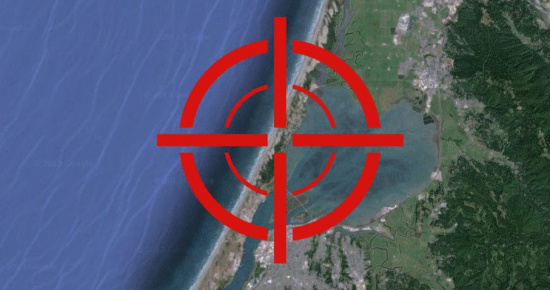How small a thing a human life on the hide of our trembling planet. Forces deeper than we can perceive, so buried and low, guttural in a wide and primal register, explode in physical profanity when faults grind.
Fuck all, in the true mother tongue.
Lost for however long in the shaking are the lives of us hangers-on, creeping about the planet on rubber wheels, black soles, distracted by menacing minutia and the meaningless babble of ticking clocks and beating hearts as they argue.
At 16, my whole world shook. Across the bridge, Samoa Peninsula is a thumb of land threaded through by State Route 255. On either side of this ribbon of highway, low houses distressed by the sands huddle amid the dunes and prickling flowers.
Ours was dirty white, long like the deck of a submarine. We’d been underwater forever, but surfaced for the funeral. Dad had to die, his diseases were happy to insist, and there was no way to bury a mountain at sea.
So now we were just floating. A double-wide in relieved distress — Dad was always difficult, angrier than any Soviet sub commander — sends out coded signals, and a broad-shouldered man of a fallen world soon came to the rescue.
I love my Uncle Stanley. In the year 1992 after my Dad’s death, he was weathering a separation from his wife, among other challenges, and he threw in with our small crew. After long shifts at the Samoa Pacific Pulp Mill, he’d come home happy and garrulous, clanging hot pots down on worn formica, splashing sauces and beating his eggs with a heavy hand.
He was flawed, out loud, and wonderful. He loved with his whole self, and fear fell away from him like so much dead skin. Though our little craft pitched and rolled on some wicked seas, he kept the damned thing afloat as my mother grieved and I learned how to be a person. No small feat.
In my rush, I ached for work. I wanted the validation of a paycheck, the freedom of pocket change. Hoarding applications like gold certificates, I invested them wherever I could.
I caught him shaking his head, and anxious for a bit of wisdom, inquired.
“Don’t be so quick to go to work, James,” he told me, carelessly tossing his green thermos into the battered cab of his red Ford Ranger. “Once you start, you’ll never stop.”
Truer words, all that.
It occurs to me all these years later that these months were when the mold was set in my life. Forces I could neither see nor guess at pressed on us from every direction, freed suddenly from old lives that had contained us.
With a job, I quickly set about saving for a car. I found one. It cost $400, and I met the limping man in a Safeway parking lot. The coupe was white, rusted through on both side panels, its brakes squiffy, its power steering recently surrendering to manual.
Uncle Stan shook his head when I rolled up to the trailer. Despite his misgivings, and the already festering demands on his own life, he spent the next several weeks wedged under the hood of my little car, doing his damndest to make it run.
Phantom problems beset us at every turn, and quickly my bank account was exhausted as we searched out problem after problem — distributor cap, spark plugs, fuel lines, fuel pumps, master cylinders, brake pads, late century American engineering.
We took one test drive, and with a wicked shake of his large head, Stan vetoed my motorized future.
“Sometimes, no amount of fixing in the world will do any damn bit of good,” he said in lieu of flowers.
On the return trip, Stan and I exchanged worried looks when the chassis heaved like a beast unhappy in chains. There was a crack, and a groan. We shunted sideways off the highway, grateful to be so close to home.
Woeful to be forever walking, I stared at my hands. Stan fumed at the gremlins. He leaned forward, as if to provide the thing momentum for the final stretch. Wobbling, broken and tired, we rejoiced when the dirty white trailer rose from the distant dust.
We pulled into the driveway just as my mother fled the house. Her hair wild, eyes unfocused, she leaped off the porch into the pockmarked yard, mindless of the many pits and burrows, reaching crookedly for the fence post. She clung there as if afraid the world would shake her away.
We emptied the car and ran to her, watching over our shoulders for whatever slavering demon had chased her forth. None was forthcoming.
Stan stood back and I froze, suddenly afraid and ignorant of the shaking that still rattled the lamp posts along Peninsula Drive.
“I’m ready for it to stop,” she screamed, staring over and through me, at the land that lay in every direction. “Why won’t it just be still?”
A fine lesson in humility.
Family photographs fall, cracks gape in concrete, water towers pop their lids and the swirling waters inside threaten a decidedly secular deluge. Highways snap like gym towels, we surf sidewalks like two-legged crabs — sideways and skittering for a grip on anything bigger than the shaking.
Yet as we’ve seen, as you’ve seen, there is nothing.
We’ll search on, though, as always, anxious for a grip. As if our lives depend on it. As if our lives require it to settle such tiny seething souls.
###
James Faulk is a writer living in Eureka. He can be reached at faulk.james@yahoo.com.

CLICK TO MANAGE